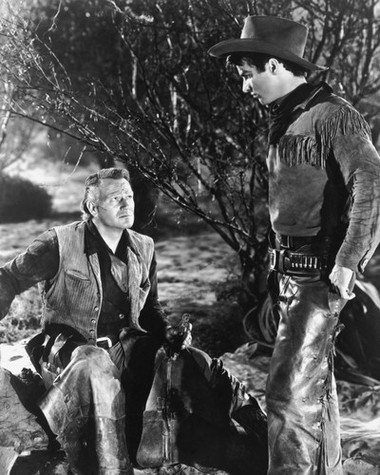
“The fate of all people who imitate others to achieve authenticity is to live a lie.”
Theodore Dalrymple, “Exposing Shallowness” (The New Criterion,June 2000)
Terry Teachout on the arts in New York City

“The fate of all people who imitate others to achieve authenticity is to live a lie.”
Theodore Dalrymple, “Exposing Shallowness” (The New Criterion,June 2000)

Two new magazine pieces by me have been published in the past few days. One of them, my latest monthly essay for Commentary, is about Western movies:
Read the whole thing here.Stagecoach set the tone for Western filmmaking from 1939 to the end of World War II….While some screen villains were not without a certain rough charm, there was no room for ambiguity among the larger-than-life protagonists who vanquished them. This one-sidedness would have caused the Western to exhaust itself as a genre had it not been for the same postwar sea change in audience attitudes that was also responsible for the simultaneous emergence of film noir. World War II veterans who saw combat were deeply unsettled by the experience, and many of them were thus drawn to films that took a darker, more realistic view of the world. Not coincidentally, most of the best Westerns to come out after the war—including Howard Hawks’s Red River (1948, starring John Wayne and Montgomery Clift), Anthony Mann’s Winchester ’73 (1950, starring James Stewart), and Budd Boetticher’s Seven Men from Now (1956, starring Randolph Scott)—partook of this darker vision….
I also contributed to a National Review symposium on personal libraries:
Read the whole thing here.Manhattan apartment contains a thousand-odd books, but I don’t think of them as a “library.” Unwealthy New Yorkers can’t afford homes large enough to amass libraries, and while degenerate city collectors keep books in the oven, I’ve never been reduced to that pitiful extremity. Indeed, I got rid of half of my books when, some 20 years ago, I moved to a much smaller apartment. I’d decided to collect art, which meant that I’d need wall space to hang it. I spent a whole day pitching volumes I’d thought I loved, and felt freer when I was done….

Buddy Rich sings Cole Porter’s “All of You” and plays an impromptu blues on an undated episode of “In Melbourne Tonight,” an Australian TV series. This segment is thought to have originally aired in January of 1957. The members of the band include Jack Westmore on guitar and Ron Rosenberg on piano. The announcer is Graham Kennedy:
(This is the latest in a series of arts- and history-related videos that appear in this space each Monday, Wednesday, and Friday)

“What moves men of genius, or rather, what inspires their work, is not new ideas, but their obsession with the idea that what has already been said is still not enough.”
Eugène Delacroix, journal entry, May 15, 1824

From 2009:
Read the whole thing here.Everybody who knows about jazz knows about “West End Blues.” I doubt, though, that most people know where the song, written by Joe Oliver, Armstrong’s mentor, got its name….

“The ego is an opinion-generating mechanism, one that calls into question the impossibility of perpetual motion.”
Patrick Kurp, Anecdotal Evidence, Feb. 10, 2019

I was driving back to Connecticut after seeing an off-Broadway show. All at once and without warning, a freak blizzard blew up, one that was bad enough to make the roads slippery and interfere with visibility. I didn’t like the way things looked, so I decided to pull over and sit it out. Just as I spotted an empty parking lot up ahead, an oncoming driver in a BMW hit a slick stretch of pavement, slithered into my lane, and knocked my rental car off the highway and into the guardrail before I could get out of his way. He stopped his car, jumped out, and ran over to me, shouting, “My God, are you all right? It was my fault—I know it was my fault!”
Fortunately, I’d already slowed down far enough that my airbag didn’t deploy as a result of the collision, and I felt reasonably sure that I was unhurt. A third driver who saw the crash happening pulled off the road to make sure that we were both all right, after which he called the police, who arrived with reassuring promptitude. Having gotten a look at the front end of my car and figured out that I wouldn’t be driving home, or anywhere else, I called Mrs. T to tell her what had happened and warn her not to expect me anytime soon. Three hours later, an all-night cab returned me to her in one piece, shaken but not stirred.
It happens that I’d never been in an auto accident before. What surprised me most about the experience was how loud it was. The crunching sound that you hear when another car runs into you is really quite overwhelming. I was just as surprised—albeit in the opposite way—when, some forty-odd years ago, I found myself in the middle of a bank robbery in the course of which pistol fire was exchanged at close range. I learned that day that when a revolver goes off indoors, it sounds just like a child popping a blown-up paper bag. (Foley artists, take note!)

On the other hand, I wasn’t even slightly surprised by how scared I was, or by how long it took for me to pull myself together. To be sure, I sounded calm enough as I spoke to the policemen, and I mostly thought, O.K., what do I do next? Nevertheless, it took me a good fifteen minutes, if not more, to stop shaking, and even though I was home and in bed by four-thirty, I found it impossible to fall asleep until well after sunrise. And while I wasn’t injured in any way, I was startled—not to mention amused—to see that a clump of my gray hair had fallen out and spread itself all over my black sweater. Since nothing had hit my head during the crash, I can only conclude that a massive rush of adrenalin loosens your hair at the roots.
In case you’re wondering, my life didn’t flash before my eyes as I bounced off the guardrail, though I did spend a fair amount of the weekend that followed thinking about how grateful I am to be alive. I’m pleased to report, too, that I seem not to have sustained any lingering post-traumatic stress. I took Saturday off, but by Sunday I felt like writing again, so I knocked out Friday’s Wall Street Journal drama column, followed by this posting.
Be all this as it may, nobody has to tell me that luck, if that’s what you care to call it, was with me that night. As they say in the movies, I’m not a praying man, but a close friend of mine who is a cantor sent me a Jewish prayer of thanksgiving the next day that is, she explained, meant to be recited after escaping danger: “Blessed are You, Lord our God, ruler of the world, who rewards the undeserving with goodness and who has rewarded me with goodness.” I’ll sign that.
* * *
Red Asphalt, a 1960 driver training film about auto accidents produced by the California Highway Patrol:

A reel of TV commercials created by Stan Freberg:
(This is the latest in a series of arts- and history-related videos that appear in this space each Monday, Wednesday, and Friday)
| M | T | W | T | F | S | S |
|---|---|---|---|---|---|---|
| 1 | 2 | 3 | 4 | 5 | ||
| 6 | 7 | 8 | 9 | 10 | 11 | 12 |
| 13 | 14 | 15 | 16 | 17 | 18 | 19 |
| 20 | 21 | 22 | 23 | 24 | 25 | 26 |
| 27 | 28 | 29 | 30 | 31 | ||
An ArtsJournal Blog